 |
|
|
Popular topics on this page:
Can't set Outlook Express as default mail client
Crimson Editor won't open multiple files
How to cut aluminum on a table saw
The neurochemistry of moderation (alcohol)
History of Jerry Jones Road and Joree Mill Pond, Valdosta
Erroneous kerning of Microsoft Sans Serif Bold type (also here)
Cell phone in the laundry
Are women forbidden to speak in church?
EndNote does not appear in Microsoft Word Tools
Scroll down or press Ctrl-F to find other topics, or check previous months.
BOOK SALE - I'm selling off some scholarly books via Amazon Marketplace. Have a look!

|
2006
March
29-31
|
New laptop and other short notes
This entry is one of the last things I'll type on the University-issued Dell D505 laptop
that I've been using for the past two years. It's a fine machine, but beginning to be
visibly battle-weary (with a crack in the plastic), and they've issued me a new Dell D610.
(I should add that there are no performance problems at all, and the University will continue
to use it, possibly as a robot controller.)
I've been trying to use the Windows Files and Settings Transfer Wizard (FASTWIZ) to transfer
my per-user registry settings, desktop, and My Documents folder.
This is not as fast and simple as one might wish when there's a lot of material to
be transferred (10 GB in my case).
What you do, basically, is back up your files and then unpack them on the other machine.
To do the backup, you have to run FASTWIZ.EXE from the Windows XP CD.
So I did that, on the old machine, saving the compressed files to a shared folder on the
new one. It took about 3 hours.
Then, on the new machine, having created a user account with the same name as the old one,
I set out to retrieve the files.
This is done by running the wizard from Programs, Accessories, System Tools.
Oops! It said I hadn't used the same version of FASTWIZ. Surprising, but perhaps true.
Did I need to do the whole 3-hour run over?
No... I put the same Windows XP CD into the new machine and ran FASTWIZ from there. It took
many hours to uncompress 10 GB of files, and I went to bed. This morning I haven't looked
at the new laptop yet to see how it did.
My friend Anthony Ayiomamitis took
this
remarkable picture of the Diamond Ring Effect at yesterday's solar eclipse.
And I've learned that, shortly before my 60th birthday in 2017, we're going to have a
total solar eclipse right here
(well, less than 100 miles away).
You know about News of the Weird.
Now enjoy the News of the Weird Blog!
Permanent link to this entry

|
 |
2006
March
27-28
|
A handy electrical engineering book
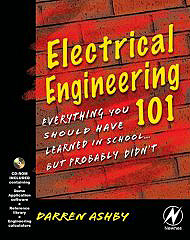 The other day Darren Ashby was good enough to send me a review copy of his
new book,
Electrical Engineering 101.
I am happy to recommend it. It's full of practical advice for the working engineer fresh out of college.
Topics covered include how to grasp Ohm's Law intuitively; how to understand op-amps without confusion;
numerous specific circuits; and even a chapter on management (for managers and their subordinates).
The publisher's web page is here.
The other day Darren Ashby was good enough to send me a review copy of his
new book,
Electrical Engineering 101.
I am happy to recommend it. It's full of practical advice for the working engineer fresh out of college.
Topics covered include how to grasp Ohm's Law intuitively; how to understand op-amps without confusion;
numerous specific circuits; and even a chapter on management (for managers and their subordinates).
The publisher's web page is here.
Most electronics books aren't practical enough. Two others that I heartily recommend are
Bob Pease's
Troubleshooting Analog Circuits
and, on a more basic but comprehensive level,
Horowitz and Hill's masterwork,
The Art of Electronics,
which has
its own web site with excerpts from the book.
And, of course, nobody can do without the
ARRL Handbook,
which actually tells you how to build electronic devices one at a time using only simple tools.
(More about it here.)
Permanent link to this entry
I'm not the only Michael Covington
I'm not the only Michael Covington in the world, and today I discovered
that the domain michaelcovington.com exists and doesn't belong to me.
At first I wondered if this was some kind of
cybersquatting scheme
to register my name in the name of someone else
and then make money selling it back to me.
No; the other Michael Covington is genuine.
He is Michael J. Covington, of Intel, and I've almost encountered him before.
He went to Georgia Tech, and people kept asking him if he was me.
Once, someone asked me if I was him.
I wish him well.
Permanent link to this entry
Cats, tortoises, and bunnies
There are persistent rumors of
tigers and other big cats
roaming the woods
near Cambridge, England.
They may be escaped pets or zoo animals
or even survivors from the last Ice Age.
The world's oldest zoo animal,
a Seychelles tortoise that had been in captivity for 250 years,
has died
in a zoo in Calcutta.
He will be missed.
But Charles Darwin's Galapagos tortoise, now 175 years old, is still alive and well at a zoo in Australia.
By now, you've heard that the
St. Paul, Minnesota, City Council got rid of an Easter bunny display
because it was "too religious."
Has anyone broken it to them that their city's name, St. Paul,
is considerably more religious than the Easter Bunny?
Note for the peanut gallery: If you're wondering what bunnies
have to do with the Christian celebration
of Easter, the answer is, as far as we can tell, nothing.
They apparently are left over from some other unrelated, forgotten holiday that fell
around the same time of year.
Permanent link to this entry

|
 |
2006
March
25-26
|
Technological confusion
One thing that interests me is figuring out
why people have trouble understanding computers
and other machines.
Sometimes it's the fault of the machines, or the people who
tell others how to use them, but sometimes it's the fault
of the confused person himself.
Many amusing incidents are documented at
Computer Stupidities,
but rather than just laugh at them, we should analyze them.
I've also encountered quite a few recurrent fallacies on my own.
Usually, what goes wrong is failing to think about a machine as a chain
of causes and effects.
Some people think of any machine as pure magic, and then they
have no idea what part of it might be responsible for a problem.
Consider the character in Computer Stupidities who thought that
software had caused the plastic cover of his printer to break.
(Actually, a wall clock had fallen on it.) Or consider a lady I once knew who didn't
see why her sewing machine needed a belt to connect the motor to the rest
of the mechanism.
Consider also the almost universal tendency to blame every computer crash
on Microsoft Windows no matter how unreliable the hardware is.
Buy a super-cheap power supply, a cheap motherboard, cheap secondhand memory,
put it all together – and it's Bill Gates' fault if it doesn't run.
And I suppose it's the Berlin Philharmonic's fault if my stereo
blows a speaker.
All this is related to syntactic thinking, "reasoning" with words
without knowing what they mean.
All of us have to do some of this all the time, but if we're smart,
we realize that it's no substitute for real understanding.
We don't want to be like Dilbert's boss, or the fast-talking computer
(or car) salesman who can name a lot of features but has no idea what
any of them really is.
A particular fallacy I've encountered over and over is
thinking that wires transmit information.
They don't.
They transmit electricity, which may or may not encode information.
I've seen this fallacy even on the part of graduate students.
The power wire to a motor doesn't "tell" the motor to run, it supplies
the energy for the motor to run.
If you think that wires transmit information, you won't understand why
different encodings of the same information don't mix.
(Serial ports versus Ethernet, or in the case of computerized
telescopes, serial port versus SBIG switches.)
You can't expect machines to "understand each other" just because you've run
a cable between them.
I've also noticed a tendency to want to network everything together
without thinking clearly about what this will accomplish.
This particularly seems to afflict amateur astronomers, who wonder how I take
pictures without a laptop, and with no electrical connection between
the camera and the telescope. After much thought, I've concluded some
people's hobby is making astrophotography complicated.
To each his own.
Permanent link to this entry

|
 |
2006
March
23-24
|
EndNote does not appear in Microsoft Word Tools
Software not designed for multi-user Windows
Our university recently bought a site license for
EndNote,
a handy bibliography database for academic writers.
What's really handy is that not only can you maintain your own
database, you can also download bibliography entires from library catalogues,
PubMed, and numerous other online databases.
I installed EndNote on my computer, logged off as administrator,
logged on as myself, and immediately noticed that although EndNote ran fine,
the interoperability
with Microsoft Word wasn't there. EndNote did not appear on the Tools menu in Word.
The reason for this turned out to be unfortunate:
EndNote's implementors don't seem to have realized Windows is a
multi-user OS.
This is 2006, not 1995, and I'm talking about the latest version of EndNote.
Nowadays, almost all Windows machines are supposed to be multi-user.
Even if it's your own personal machine, you are advised to have one
account for installing software, with administrator privileges,
and another, less privileged account for ordinary use, so that if
a virus hits you, it won't be running as administrator.
When you install EndNote, two things happen:
The software gets installed on the machine, and two files get written
into the administrator's user profile so that Word can talk to EndNote.
If the administrator account is the one that will be running EndNote and Word,
all is well.
But if you log on under any other account, you have a different user profile,
and those two files aren't in it.
EndNote's proposed solution to the problem is
here.
Unfortunately, I wasn't able to follow those instructions.
When I tried to rerun the installer under my ordinary user account, it crashed.
And when I tried to get Word to tell me its startup path, I got a long string
with "..." in the middle, meaning that part of it was left out to fit on the display.
I had to do some snooping to get the real path, which can be described
concisely as
%APPDATA%\Microsoft\Word\STARTUP
though yours may be different.
What I ended up doing was packaging EndNote's two files into a
self-extracting ZIP with
%APPDATA%\Microsoft\Word\STARTUP
as the destination.
Every user in our whole lab will have to run this self-extracting ZIP
from his own account, at least if he wants to run EndNote with Word.
The correct solution is simple. EndNote should check the user's
profile, and write those files into it if needed, at run time, not
at install time. That is, it should write in the user's profile
when the user is actually logged in and running EndNote.
I wonder if EndNote 10 will correct this.
For more of my ranting about similar problems in other programs,
see this.
Permanent link to this entry
Notes from all over
Journalistic use of Facebook: See
this.
A man accused of rustling cattle was easy to find on the Web.
Romance broken up by software bug:
Firefox
failed to conceal
this gentleman's online philandering.
Scroll down and read the whole story; it sounds like she was lucky to lose him!
Our laundered cell phone has completely recovered
from its misadventure.
It may have lost some long-term reliability, though.
Permanent link to this entry

|
 |
2006
March
22
|
Miscellany
 If you need a pair of headphones that really
block out room noise, let me recommend the
Sony
MDR-V600.
No active noise cancellation, just good, big padded earcups.
Excellent sound, too.
These are often used in recording studios.
If you need a pair of headphones that really
block out room noise, let me recommend the
Sony
MDR-V600.
No active noise cancellation, just good, big padded earcups.
Excellent sound, too.
These are often used in recording studios.
I had only one problem with mine.
They are too sensitive to work well with a computer soundcard unless you include an
inline volume control such as
Radio
Shack's inexpensive one.
Without it, you have to turn the volume all the way down, and you hear too much hiss.
A really remarkable picture of a solar eclipse, bringing out lots of detail that is normally
overexposed on film,
is here.
Friedhelm Dorst and Miroslav Druckmüller used digital techniques to reveal coronal streamers
and earthlit detail on the moon. Wow!
A few recent news items:
It is becoming clearer how the Great Moscow Bank Robbery was done:
Some cash register software was actually
storing people's PINs rather than
just using them to validate the cards.
(See also
here.)
I thought secretly storing a PIN was illegal.
Product liability law
will kill
the tobacco industry.
No further regulation is needed; just let the legal machinery run.
Now that it's known that the tobacco industry knew of the health hazards
of smoking long before the Surgeon General's 1964 report, and actively
concealed the information, we're in a situation where the vendors
sold people a product that they
knew would harm them while concealing the hazard. 'Nuff said.
Finally,
don't
use Gmail unless you're comfortable with the idea that your e-mail might be stored permanently
and disclosed in response to a court order.
Permanent link to this entry

|
 |
2006
March
19-21
|
Are women forbidden to speak in church?
Solution to a minor biblical mystery
St. Paul's first letter to the Corinthians contains the following puzzling
passage:
As in all the churches of the saints, the women
should keep silent in the churches. For they are not permitted to speak,
but should be in submission, as the Law also says.
If there is anything they desire to learn, let them ask their husbands at home.
For it is shameful for a woman to speak in church.
On the basis of this passage, a few Christians flatly forbid women to speak
to church groups, while the rest of us believe Paul was addressing some
local problem at Corinth the details of which have been forgotten.
Now
N. T. Wright
thinks he's figured it out, and I'm inclined to agree with him.
In the Middle East, women were, and still are, seated separately from the men
in church and at meetings.
Further, traditionally they're less educated and less well-traveled than the men.
Another important characteristic of the Middle East is the abundance of
language barriers. Particularly in ancient times, and to a considerable
extent today, dialects differ almost from town to town.
Sermons, especially by a traveling preacher, are given in the standard
literary language: Classical Arabic today, or in Paul's time a "high" variety
of Greek, Hebrew, or Aramaic.
So the women are likely to have trouble understanding the preacher, and they
mumble among themselves, "What did he say?" (or even talk about other things)
until they have to be told to quiet down.
That happens in Arabic-speaking churches today, and it surely happened in the church
at Corinth and in synagogues for a long time before that.
The reason Paul didn't explain himself further is that he was addressing
a very familiar problem.
Scripture quotations are from The Holy Bible, English Standard Version,
copyright © 2001 by Crossway Bibles,
a division of Good News Publishers. Used by permission. All rights reserved.
Permanent link to this entry
Miscellany
So far,
no text message spam
on my cell phone at all.
At age 48, I may finally join the texting crowd.
Cingular even provides an e-mail address through which short text messages
can be sent to my phone.
Only my most trusted associates are going to know what it is.
Today's bad web site award goes to
U.S. Airways.
It took me an hour to buy a plane ticket this afternoon!
Lots of clicking and waiting 5 minutes for anything to happen, or
getting "This page cannot be displayed" and then having to hit "Refresh"
and finding myself several steps back in the process.
It would have been more honest of them to shut the whole thing down if
it was inoperative, rather than making customers suffer.
I eventually triumphed and will be able to crawl up to Washington, D.C. next month
from the local airport (Athens, Ga.)
via Charlotte (N.C.)
without going through the world's busiest airport (Atlanta).
Permanent link to this entry

|
 |
2006
March
18
|
Cell phone in the laundry
I forgot to mention that Melody's cell phone
(a Samsung 427m) went through the laundry about a week ago.
How much harm did it do? Possibly none, but the jury's still out.
Initially, of course, the wet phone didn't work.
We removed the battery and
opened up the case to let it dry out as much as possible.
I also squirted in just a bit of isopropyl alcohol, standard
procedure for drying out damp electronic equipment.
Within a few hours, the phone was functional except that the LCD display
was dim and blotchy.
We then let it spend two days with its case opened up in our warm attic
(not oven-like at this time of year, but maybe 90 F),
put it together, and resumed using it.
The blotches are still gradually shrinking, and we hope that the display
will make a full recovery as it finishes drying out.
[Note added March 24: It did.]
Permanent link to this entry
"ADMIN TXT MSG ONLY"
This is an option that I had Cingular set on all three of our cell phones
a while back when we started getting text message spam.
It costs nothing. Its effect is to block all text messages except
those from Cingular. For example, you still get a text message if you
dial *MIN# to find out how many minutes you've used.
But text messages from other phones just go into the bit bucket.
They seem to have gone out OK, but they never arrive.
I'm not sure this is desirable. Admittedly, at present I pay 10 cents
each to receive non-administrative text messages, even if they're spam.
And text messages are not my idea of how to carry on a conversation.
They're slower than Morse code. In fact, how soon will someone make a
cell phone that understands Morse? That would not be a bad way to enter
characters, in the hands of an experienced operator.
I'd probably be able to type 15 words a minute right away.
In the heyday of Morse code, good telegraphers could do 40 wpm.
But getting back to the cell phone... I'm going to have this option turned off,
on my account only, and see what happens. There are now some
interesting uses for text messages, such as the ability to send
them from the Internet (click
here;
no login required)
and to receive them automatically when FedEx delivers a package.
I'll also set the phone not to ring when a text message arrives.
That's crucial!
Permanent link to this entry
More cellular telephone lore
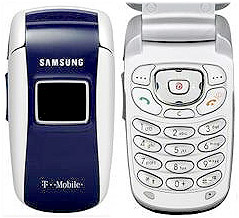 My new unlocked multiband cell phone has arrived,
just 2 days after I completed the sale,
and I heartily recommend
WirelessRush,
the eBay vendor I got it from.
My new unlocked multiband cell phone has arrived,
just 2 days after I completed the sale,
and I heartily recommend
WirelessRush,
the eBay vendor I got it from.
It's a Samsung X495 and was originally packaged as a T-Mobile prepaid.
It reached me in the T-Mobile packaging, which had been opened, presumably
to remove the original SIM card and unlock the phone.
From the large number of these on the market I presume T-Mobile has
liquidated them (although T-Mobile is still selling this same model,
very cheap).
Voice and text messaging functions work just fine,
and the display reads "Cingular" as it should.
But because the phone contains T-Mobile's firmware, it can't access the Internet
through Cingular. That means it can't download ringtones or graphics
from Cingular. And because my SIM card is from Cingular, it can't access
the Internet through T-Mobile either. But these are not fatal difficulties.
At today's prices, I don't want to surf the Web on my cellphone.
I've also been able to use my British Virgin Mobile SIM card in this phone
(thus proving it's unlocked).
In that case, the phone connects to T-Mobile
and considers me to be an Englishman
roaming far from home at great expense.
So I won't actually use it that way.
Virgin Mobile, incidentally, is a reseller of T-Mobile's network bandwidth
both here and in Europe. So I expect the display will say "T-Mobile" in
England too.
I've found a good resource for more about cell phone unlocking
and international use: The Travel Insider.
Another good one is
Cellular Abroad, from whom you
can order prepaid SIM cards for practically all the countries in the world
and get detailed instructions on how to use phones there.
Permanent link to this entry

|
 |
2006
March
17
|
Cleaning out the inbox...
Happy St. Patrick's Day!
The other day I saw a news story, "St. Patrick's Day Goes International."
Don't they realize that saints' days are worldwide in the first place?
There have been
allegations
that it's
illegal to unlock a cell phone.
As far as I can find out, the people who say that are talking through their hats.
There is no such law.
There could conceivably be provisions in your contract that say you won't unlock the
cell phone that you bought at a subsidy – but apart from that, unlocking a cell phone is legal.
You own the phone; do with it what you want.
Is Microsoft abandoning
the .NET Framework?
I hope not, and I don't think so.
They're just not using it to write operating systems.
That is, after all, not what it's for.
If you use AOL, you
may not be getting all
your e-mail.
Aggressive spam filtering is risky!
We don't know what we're losing.
Permanent link to this entry

|
 |
2006
March
16
|
The best font for Windows is Tahoma
And the best way to see it is ClearType
For years, the default font for the type displayed in Windows programs
has been Microsoft Sans Serif or its near twin, MS Sans Serif.
But this is not always a particularly good-looking font,
particularly in boldface.
Sometimes it even has a
strange kerning error.
What is the alternative? Arial, maybe?
Actually, a few years ago Microsoft developed three new fonts that are
designed to look good on computer screens and are shipped with
every copy of Windows XP.
They are Tahoma, Verdana, and Georgia,
all designed by Matthew Carter.
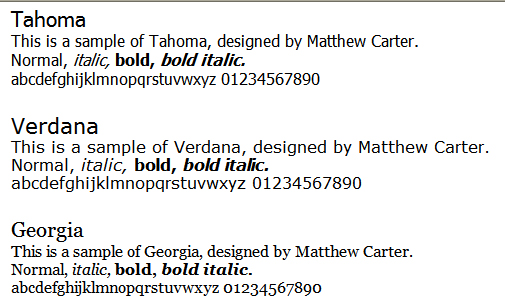
Tahoma is the default screen font for Windows XP.
If you create software, you should no longer be using Microsoft Sans Serif.
It is less legible.
Use Tahoma most of the time.
Verdana is even easier to read, but it can be too wide to fit
in place of other fonts.
In .NET Framework, if you specify the font of a form, most if not all of the
controls on it will inherit that font, if you have not separately specified
fonts for them.
Be sure to preview all your type with ClearType (antialiasing) turned on and off
since the appearance will be dramatically different.
Here is a pair of samples, cribbed from a Microsoft web page, to show what ClearType achieves:
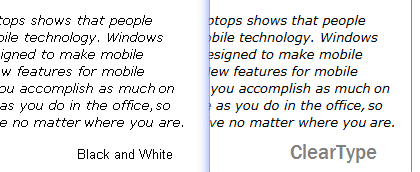
You can turn ClearType on by right-clicking on your desktop and choosing Properties,
Appearance, Effects.
More information here.
On that web site is a very useful software tool for tuning ClearType for your computer.
Permanent link to this entry
Comedy at the Fed
The Federal Reserve Board is proposing to issue
guidelines
telling banks
not to make so many non-traditional mortgage loans
(interest-only loans and loans that can go into negative amortization).
They invited public comments on what the guidelines should be.
What did they get? I'll bet the financial counselors and bankruptcy
lawyers of the U.S.A. know a lot of things that the Fed ought to hear,
but in fact that's not who they heard from.
They got hundreds of copies of the same letter from individual
bank employees in Florida,
basically opposing the guidelines.
Look at them
here.
Do these people think the Fed just counts the letters without reading them?
Permanent link to this entry
Cell phone verdict
After making extensive inquiries by phone, I was told that
Cingular does not unlock cell phones unless you've had
the phone at least 90 days and you have a good reason to want
it unlocked.
So Cingular lost the sale, and I ordered a triband phone from an eBay vendor.
Permanent link to this entry

|
 |
2006
March
15
|
The locked-cell-phone blues
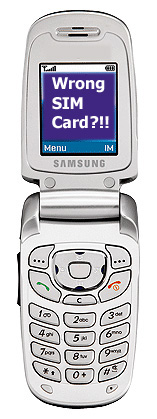 I have two cell phones, a regular one for use here in Georgia, and a prepaid one for use in England.
Both are GSM phones with removable SIM cards.
I have two cell phones, a regular one for use here in Georgia, and a prepaid one for use in England.
Both are GSM phones with removable SIM cards.
A trip to England is coming up, and
I'd like to use one phone in both countries by putting the appropriate SIM card in it.
That is what multiband "world phones" are for.
So today I went to check with my American cell phone company.
They'll give me a good deal on a Samsung "world phone"
(triband GSM, 850/1900 for here and 1800 for the UK) if I add a line to my
family plan, which I need to do in any case, for Sharon.
But the clerk told me they can't or won't unlock the "world phone"!
I hope she was mistaken, because a "world phone" is more or less useless
if it is set so that it only works with one company's SIM cards.
Since this company doesn't serve England, I'd be up the creek without a paddle.
(Or up the Cam without a puntpole, to be more precise.)
I've joked for a while that
this company's name is apparently derived from Latin cingulum
'belt, rope to tie things down.'
To avoid being tied down, I'll probably buy an unlocked triband GSM phone
on eBay.
I'm also thinking of petitioning the FCC to do away with locked cell phones.
If you own a cell phone, you ought to be allowed to use it on any network.
I suppose locking might make economic sense if the company sells prepaid plans
and gives a large subsidy on the phone itself.
But I don't see any rationale for locking cell phones when the customer
has signed a contract to make monthly payments.
I contend that the main effect of locking is to waste a lot of telephones
by preventing reuse.
Update: No news about Samsung unlocking yet, but I was able to unlock my
British Nokia 3310 by following the instructions
here.
Unlocking is done by entering a password which is computed from the phone's serial number.
This one worked on the first try.
Now it will be easier for me to resell my Nokia to someone who wants to use it in Britain.
Permanent link to this entry

|
 |
2006
March
14
|
The great Moscow bank robbery
and other strange goings-on
See also the update below.
Esteemed readers: Please go and check your bank balance right now
(on line or by telephone)
on every account for which you've ever had a debit or ATM card.
You're looking for something like this:

A large number of fraudulent ATM charges were made in Russia last week
and are just showing up at American banks today.
The industry isn't saying much about how the fraud happened.
Brief accounts of the incident are
here
and
here.
Contrary to early reports, Citibank isn't the only victim.
If you're a victim, bear in mind that this is bank fraud, not "identity theft."
The victim is your bank, not you.
Nonetheless, you are the one who has to sign a fraud report in order to get your
money back.
That's not all. I've experienced other strange goings-on relating to Internet
financial transactions yesterday and today.
Amazon has a technical failure that affects their ability to take credit cards.
Paypal wouldn't let me log in until I changed my password.
I saw someone else experience unexplained inability to log on to Bank of America online banking.
I think there's something else going on which we'll hear about soon.
My overall conclusion? Banks aren't very secure.
Their use of the Internet and their acceptance of overseas charges
need to be tightened up.
Update:
According to CNET,
the varmints have been caught.
I'm glad the police did their job swiftly.
This incident may actually deter computer crime
instead of glamorizing it.
A word of advice: Don't use debit cards.
They are not subject to the same regulations as credit cards,
and you don't have as much protection.
Naturally, you still aren't liable if the bank gets robbed,
which is what happened here, but you may be considerably
inconvenienced.
Permanent link to this entry
Down with flyspeck type!
As laptop screens improve, the manufacturers seem to think that we want
a microscopic rendition, on a 14-inch screen, of the display that
ought to appear on a 21-inch desktop LCD screen.
Right now I'm using a Dell D505 in its native mode, which is 1400×1050 mode.
The capital letters in Windows drop-down menus are 1/16 inch high.
That's 4.5 points, in typesetting parlance.
Windows thinks it's 8-point type and expects me to read it.
It's true that you can tell Windows to use larger fonts.
But the effect of this setting is very irregular, and most software isn't affected.
And you can tell Windows that you have a super-high-resolution screen.
(Display properties, Settings, Advanced.)
This is great for text-based software, but it makes
strange things happen to pictures, especially in Internet Explorer.
It's also true that you can set your computer to a screen
resolution other than maximum.
But guess what? This is an LCD, not a CRT, and if you use any mode
other than the preferred one, it gets blurry.
Most of the time, I use 1024×768 on this computer and just put up with the blur.
I want to draw a line in the sand and say: No more than 96 pixels per inch.
Don't make the type tiny just because you can.
I want a computer, not an eyestrain generator.
Permanent link to this entry

|
 |
2006
March
13
|
Erroneous kerning, continued
A few more notes:
The typography team at Microsoft is looking into this, and I'll report
what I find out.
Permanent link to this entry

|
 |
2006
March
12
|
Erroneous kerning of Microsoft Sans Serif Bold type
This is definitely the most subtle Windows bug I've ever found,
and the only reason I know what to call it is that I'm married to
a graphic designer.
Look at the words "Evaluated by" in the two pictures below.
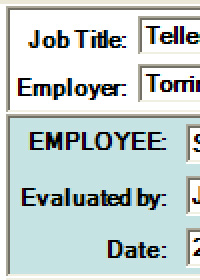 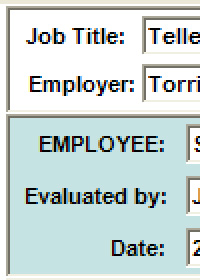
In the first picture, the letters are wider apart at the beginning
of the phrase than at the end. That is, as typesetters say,
the kerning is uneven. You can see this also in
"Employer" and "Job title" at the top.
In the second picture, the letters are spaced evenly.
That is, the kerning is correct.
This problem is hard to reproduce; I don't know under what conditions Windows mis-kerns
the letters, but I've seen instances of it that are much uglier than these.
I don't know if it's confined to .NET Framework; if so, it's been with me through all three versions.
And it's not confined to one computer or video card.
I do know that the problem is confined to the Microsoft Sans Serif Bold font.
It doesn't occur if the type is not boldface, nor does it occur with other fonts.
The picture on the right is free of the problem because there, the font is Arial.
Melody, who is a typesetting expert, thinks that the kerning numbers that are stored with
the letterforms are incorrect somehow – probably only on some of the letters.
Either that, or the algorithm for interpreting them, when type is rendered on the screen,
has a bug in it. The latter is what I suspect. I think some kind of error accumulated
when rendering a long character string under some conditions.
All I know is that it makes Windows software look worse on the screen than it ought to.
Microsoft Sans Serif is Windows' default font. We see it everywhere, although usually
not in boldface.
Permanent link to this entry

|
 |
2006
March
10-11
|
Jerry Jones Road and Joree Mill Pond
The oldest architectural feature of Valdosta?
Below you see part of a USGS map of my old neighborhood in Valdosta, Georgia,
with the houses I lived in at various times marked as red dots.
[Update:] The lowest of the four red dots is incorrect.
See this note.
The main north-south artery through this area is Jerry Jones Road
(recently renamed Jerry Jones Drive),
and "the mill pond" is a prominent feature at the north.

What I didn't know until just now was the history of the region.
I knew it had been farm land until the 1950s. On the map,
roads built after 1961 are shown in purple, and in 1964 I remember
a wheat field behind the houses on the north side of Dellwood Drive.
(I should remind people outside the area that the southernmost third of
Georgia wasn't settled, other than by a sparse population of Native Americans,
until after 1860. This is late-1800s frontier country, not 1700s colonial America.)
It turns out that this whole area corresponds roughly to
the plantation of Berry Jones (1799-1854), who settled
there before Valdosta existed.
In his time, the nearest town was Troupville, a few miles to the west.
His mill pond was built with slave labor in 1849, and apparently,
its concrete spillway, which I rode past several times every day as a child,
is one of the oldest visible architectural features of Valdosta –
possibly the oldest.
Berry Jones named his pond after a kind of bird that he called a joree
but most people call a towhee
(see it here,
listen to it here,
and decide for yourself which name fits).
I didn't know what a towhee was until just now; in Valdosta I probably mistook
all of them for robins.
Nobody knows who Jerry Jones was. Berry Jones had a son named Jeremiah,
for whom the road may have been named, or "Jerry Jones" may be a
misspelling of "Berry Jones." Similar things have happened elsewhere;
for example, the middle Georgia town of Fort Valley was Fox Valley until
someone in the Post Office Department couldn't read someone else's handwriting.
I learned about Berry Jones and the mill pond from an article by Jim Nichols in
Valdosta Magazine,
Winter 2006.
Permanent link to this entry

|
 |
2006
March
9
|
The neurochemistry of moderation
Why most drinkers don't get drunk
An interesting
study
from the Yale School of Medicine
reports that
alcohol affects two brain chemistry systems, GABA and NMDA.
The GABA effect is what people normally enjoy.
The NMDA effect, which appears with higher doses of alcohol,
is similar to the anesthetic drug ketamine.
It's said to
involve feelings of unease (even anxiety) and sickness.
Now here's the interesting part.
Some evidence indicates that
people who are less sensitive to ketamine are more likely to be alcoholics.
Apparently, the NMDA effect of alcohol is the signal to stop drinking.
It reminds me of a description of an alcoholic I once read:
"If one drink made him feel better, ten drinks would make him
feel better yet. He didn't have a limit."
Permanent link to this entry
Too popular for my own good...
At the moment I have three publishers wanting to sign me up to write books
(on three separate subjects, of course). I've said "no" to two of them and
"probably not" to the third.
What's all this about struggling writers who can't get book contracts?
In my case, some considerations are that:
Of course, every man has his price. A big enough advance and royalty rate for
an easy-to-write book would get my attention.
Permanent link to this entry
Cleaning out the inbox...
You can hear the voice of C. S. Lewis (recorded 60 years ago)
at this
BBC web site. Want to save a copy for your own use?
There's no "save" button in RealPlayer, but most soundcards can record
their own output as described here.
Speaking of C. S. Lewis, here's
a nice walking tour of Oxford
geared toward those who first learned about Oxford through the writings of Lewis and Tolkien.
And speaking of ideas that Lewis would definitely agree with, see
this
commentary about "Pollyanna preachers," a currently popular kind of evangelicals who tell us we
are supposed to cheerfully accept all kinds of misfortunes as the will of God.
Surely one of the main points of the Gospel is that all is not right in the present world.
It is the atheist, not the Christian, who has to believe that there is no ground (except our own wishes
and tastes) for wanting things to be better.
Permanent link to this entry

|
 |
2006
March
8
|
Glukoza fights off the male chauvinist pigs

|
|
If you need a laugh,
watch
this video,
which was made by (or for) Russian teen singer
Glukoza
to commemorate the 60th anniversary of V-E Day
and also to complain about her piggish male
admirers.
Glukoza is a 19-year-old blonde.
Her stage name means "glucose."
The lyrics of her song are translated
here.
|
Permanent link to this entry
A fountain pen with too much ventilation
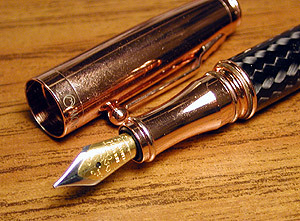 The Monteverde pen that Melody gave me
for our anniversary
has always had a tendency
to dry out between uses.
That made it hard to start even if it had only been unused
a couple of hours.
The Monteverde pen that Melody gave me
for our anniversary
has always had a tendency
to dry out between uses.
That made it hard to start even if it had only been unused
a couple of hours.
Today I found out why: European bureaucrats.
Apparently, laws in the EU require pen caps to have
enough ventilation to keep a child from suffocating
if he sucks a pen cap into his trachea.
That amount of ventilation is incompatible with a properly functioning fountain pen.
So tonight I plugged the excessive vent hole with wax.
The technique was to soften a bit of wax, roll it into a ball,
drop it into place, and then tamp it down with a warmed metal rod.
Thanks to
Richard Conner's fountain pen troubleshooting page,
which put me on the trail of the problem and the solution.
Permanent link to this entry
How to cut aluminum with a table saw
The other day, some experts on rec.woodworking
and rec.crafts.metalworking were able to confirm what I had found out from
personal experience:
If you need to cut aluminum with a table saw or circular saw,
use a carbide blade (marketed for cutting wood)
rather than an "aluminum-cutting" steel blade.
I tried both. The fine-toothed "aluminum-cutting" steel blade worked very
poorly and got the aluminum very hot. Maybe its earlier career,
however brief, had already worn it out.
The carbide blade worked beautifully. I didn't use my best Freud carbide blade,
but an older Black & Decker one. I'm told there are aluminum-cutting
carbide blades, with the teeth ground a bit differently, but this one worked
as well as I could wish.
I used my homemade sliding cutoff box, shown below (with a piece of
aluminum ready to be cut).
This is my most-used table saw accessory; it makes it easy to crosscut
anything up to the size of a 2×10 at a perfect right angle.

The bottom of the box is 1/4-inch plywood, painted gray except for a red safety zone
into which fingers should not go.
The front and back of the box are oak, and there is a hard maple block (painted red)
to hide the blade as a cut is finished. The top is a narrow (4-inch) piece of
clear Plexiglass.
The box is guided by two
Plexiglass strips (not visible) on the bottom that fit into the miter gauge slots.
These are held in place with wood screws countersunk into the Plexiglass.
To adjust them to an exact 90-degree angle, I removed one or another wood screw,
as needed, and inserted a piece of toothpick into the hole to displace the screw sideways.
This is a time-honored way to "move" a hole for a wood screw.
The slot for the blade was cut when the sliding box was actually put on the
saw for the first time. Naturally, it is only for use with the blade
straight upright.
If you're cutting aluminum without a sliding cutoff table, put a piece of
wood underneath it for support.
Also, don't let hot metal particles get into a dust collection system;
airborne sawdust is flammable!
Permanent link to this entry

|
 |
2006
March
6-7
|
Various and sundry...
This is becoming a less-than-daily notebook, but that's how it will stay
until I'm less busy. In the meantime, here are a few short notes.
Jupiter apparently has grown a second Red Spot.
Ovals on Jupiter are common, but this is the first time one of them has turned
the same reddish-brown color as the Great Red Spot.
I hope it lasts and I get to photograph it.
Panasonic has introduced a new DSLR
with continuous live viewing on the LCD screen. That should be extremely handy for astronomy if the
camera can be set to display a magnified live view for continuous focusing.
I wonder how well the sensor performs.
Part of the "history" behind The Da Vinci Code reportedly comes from
manuscripts faked by Pierre Plantard
(scroll down to the end of the article,
and see also here
and here).
Finally, Warren Buffett has some penetrating remarks on the question of
enriching
your stockbroker versus enriching yourself.
Permanent link to this entry

|
 |
2006
March
3-5
|
Short notes from Atlanta
I just got back from taking Melody out for her belated
Valentine's Day date, which included an overnight stay in Atlanta.
We ate excellent (and mild) curry at
Trader Vic's on Friday night, and the next day,
she went to a meeting while I did some shopping for myself
and some for the University.
Both Wolf Camera and Showcase Photo look depleted,
with lots of empty space.
Photographic paper is disappearing faster than film; I'm guessing
film photographers must be making their prints digitally.
At Wolf, the selection of darkroom chemicals is becoming spotty;
no more Xtol, and in fact the only general-purpose film developer
was HC-110. I would have thought D-76 would hang on longer.
Computer stores, of course, are thriving.
If you're outfitting a laboratory (as I presently am),
note that Fry's has 4-foot 12-outlet power strips for $25.

|
|
New toy (for the lab, not for me): a $40
digital caliper
that measures objects in inches and millimeters.
But now the younger generation will never learn to read verniers!
|
Permanent link to this entry

|
 |
2006
March
2
|
Can't set Outlook Express as default mail client
Or: Outlook Express falsely reports that it is not the default mail client
This is a Windows problem that I spent some time troubleshooting today.
It apparently came in with the latest Microsoft Outlook update.
It affects people who have Outlook installed on the machine but would still
rather use Outlook Express for e-mail. That may not be too many of us.

The symptom is that you get this message ("Outlook Express is not currently your default mail client"),
and even after clicking "yes," you get the same message again the next time you start up
Outlook Express.
Mail and news client settings made in Internet Explorer (Tools, Internet Options, Programs)
also do not stick.
Outlook Express may even be your default mail client when it falsely reports that it is not.
To check, run "mailto:" (just that, without quotes, in the Run... box).
It will bring up your default mail client, whatever that is.
I don't know the entire source of the problem, but here's a quick fix.
Log in with administrator privileges and edit the Registry.
In both HKEY_LOCAL_MACHINE\Software\Clients\Mail
and HKEY_LOCAL_MACHINE\Software\Clients\News,
change the "(default)" value to "Outlook Express" (without quotes).
Or run
this script for mail and
this script for newsgroup reading.
I don't know why the clients are identified in HKEY_LOCAL_MACHINE rather than HKEY_CURRENT_USER.
You'd think they'd be per-user settings, and on some level, maybe they are.
I also don't know whether my workaround leaves you unable to set the clients to
anything other than Outlook Express.
I'd be glad to hear from anyone who knows what's really going on here.
Permanent link to this entry
Running Crimson Editor if you're not Administrator
Crimson Editor won't open multiple files
Crimson Editor is a fine editor for programming
and for typing HTML and LaTeX.
It's free. But it has one rather serious shortcoming.
Its designer didn't seem to be fully aware that Windows is a multi-user operating
system and not everybody has administrator privileges.
I have unkind words for
people who program that way.
Nonetheless, because Crimson Editor is so good in
other ways, I've been willing to live with its limitations, which are mainly
that some of its settings are per-machine rather than per-user.
But another limitation
bit me today. For unknown reasons, Crimson Editor wouldn't open
multiple files at once. It thought it was doing so, but the
files and their tabbed windows just didn't show up.
The key to the mystery was that Administrator could still edit multiple files.
Only ordinary peons couldn't.
The solution was that Crimson Editor needs to write on files in its
Program Files directory. Specifically, it needs to write on
C:\Program Files\Crimson Editor\cedt.* except cedt.exe
C:\Program Files\Crimson Editor\cmdline.txt
If it can't do that, there's no error message,
but it can't edit multiple files. (Go figure why.)
So I put a couple of CACLS commands into our install script and gave all users
write permission on those files. (This can also be done manually.)
And Crimson is again serving me well.
Permanent link to this entry

|
 |
2006
March
1
|
For Ash Wednesday, two theological notes...
Both revised for conciseness March 9.
An odd bit of ecclesiology
I belong to a Baptist church.
Our national organization, the Southern Baptist Convention (SBC),
has issued a new set of
requirements for missionaries
that has raised eyebrows:
Baptism must take place in a church that practices believer’s baptism by immersion alone,
does not view baptism as sacramental or regenerative, and a church that embraces the
doctrine of the security of the believer.
A candidate who has not been baptized in a Southern Baptist church or in a church which
meets the standards listed above is expected to request baptism in his/her Southern
Baptist church as a testimony of identification with the system of belief held by Southern Baptist churches.
Whoa there.
They're taking the position that even if a person's baptism met the appropriate
standards, that person should be rebaptized if the church where it happened
wasn't one of ours.
There is a case being disputed right now where a missionary's baptism met Baptist
requirements but happened in a Methodist church.
Since the earliest times Christians have agreed that a person can only be baptized once.
The only reason for repeating a baptism is that the first one was invalid – which is
not what is being claimed here.
The theology behind this does not strike me as well-thought-out.
It smacks of
Landmarkism,
a mid-19th-century view of history that I can only describe as erroneous.
In its crudest form, Landmarkism claims that the Baptists are the only true church
and that they have existed – secretly and under many names – throughout history.
If you say that Baptist ideas have kept cropping up through history because they're Biblical,
I agree with you.
But that is not the same as claiming that Baptists existed per se.
The people who are pointed to as Baptist precursors are a motley crew, comprising
people expressing speculations, people with odd ideas, and outright heretics.
(I, for one, don't want to claim the Albigensians as spiritual ancestors...)
Landmarkism is radically different from the usual Protestant view – which is,
as far as I know, the usual Baptist view – namely that in the Middle Ages,
the institutional church accumulated such a burden of error that it needed to be
reformed, and in the process, it broke up.
None of the resulting Protestant churches can claim to be the only true church,
though some are more doctrinally accurate than others.
Permanent link to this entry
The "new perspective" on St. Paul
If you're an evangelical Protestant, you've probably had it drummed into you
that the main message of St. Paul's epistles is that
we are saved by faith, not works.
That is, we are reconciled to God by trusting Christ,
not by our own merits.
While this is true (and is something all Christians agree on),
many biblical scholars now think it is not Paul's main point.
This is called the
"new perspective on Paul"
and the theologian N. T. Wright is one of the leaders.
Everyone agrees Paul's main concern was to bind together, into one community,
two kinds of new Christians.
Some were Jewish (and were barely aware that Christianity was different
from Judaism); others were Greek pagans.
So Paul must have been writing to counter some widespread misconception.
And salvation by works was not a widespread misconception on the
part of that audience.
Salvation by grace – reconciliation to God through His mercy
rather than our merits – has always been a clear part of Judaism.
New research on first-century Judaism makes that clear.
Rather, according to the "new perspective," Paul was writing to establish that
salvation does not require following Jewish rituals ("the works of
the Law") – Christianity is open to everyone.
That is his essential message.
If this is right, then Paul wasn't defending Calvin against Arminius, or Luther against the Pope,
or even Augustine against Pelagius.
Permanent link to this entry

|
 |


![]()











 The Monteverde pen that Melody gave me
The Monteverde pen that Melody gave me


